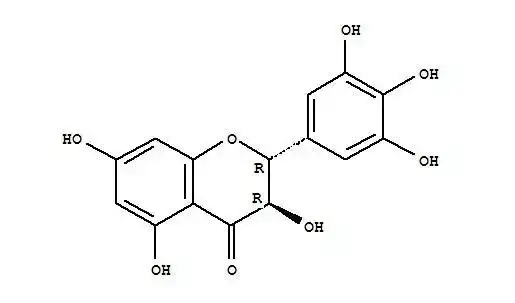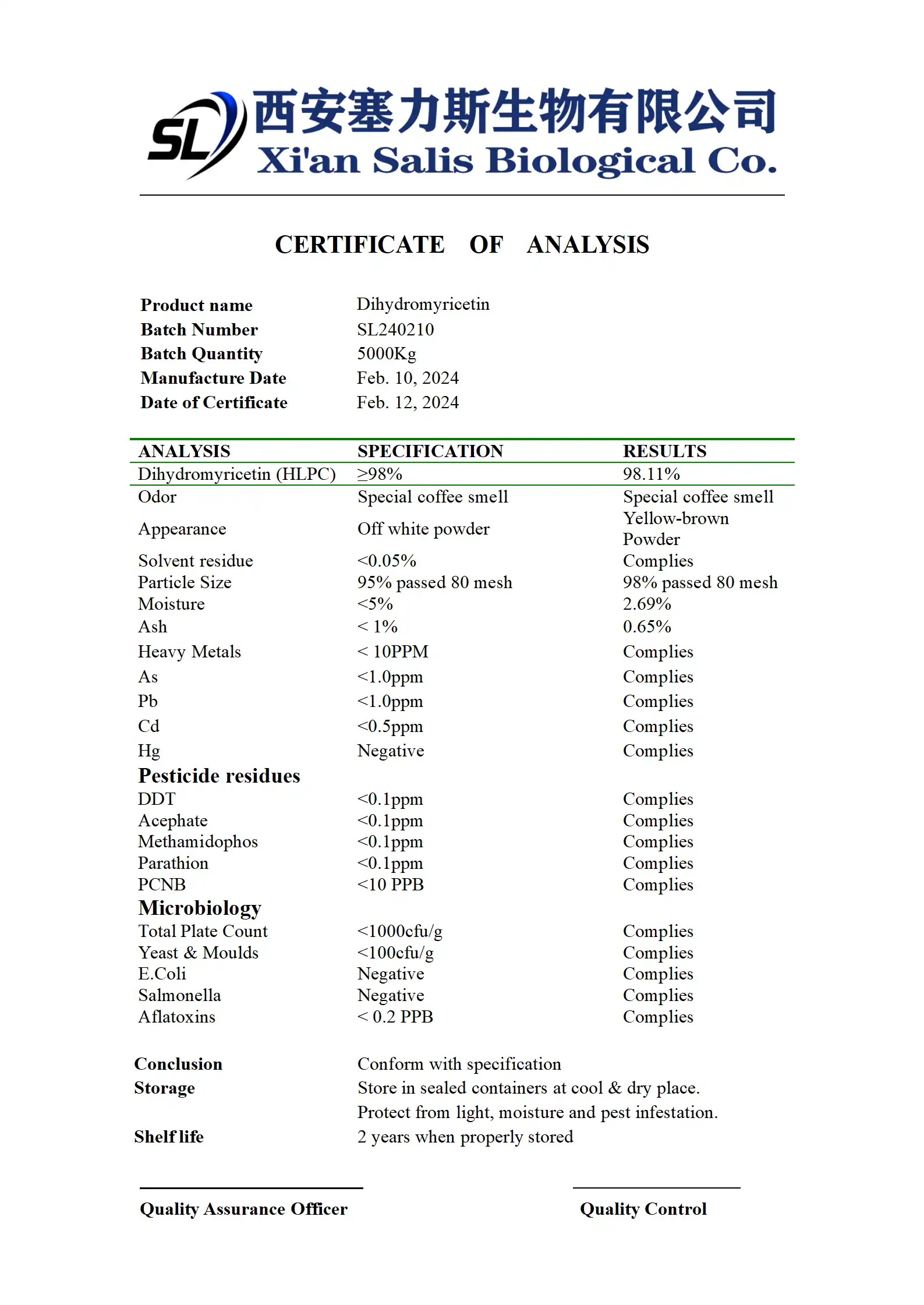
What are the health benefits of Dihydromyricetin?
Dihydromyricetin Powder has been the subject of numerous studies investigating its potential health benefits. While research is ongoing, several promising effects have been observed:
- Liver Protection: DHM has shown hepatoprotective effects, potentially helping to protect the liver from damage caused by alcohol consumption and other toxins. Studies have indicated that DHM may enhance alcohol metabolism and reduce alcohol-induced liver damage by decreasing fat accumulation and inflammation in the liver.
- Hangover Relief: One of the most popular uses of DHM is for hangover prevention and relief. Research suggests that DHM may help alleviate hangover symptoms by accelerating alcohol metabolism and reducing alcohol-induced cognitive impairment.
- Neuroprotection: Some studies have shown that DHM may have neuroprotective properties, potentially helping to prevent or slow the progression of neurodegenerative diseases such as Alzheimer's and Parkinson's. This effect may be partly due to its antioxidant and anti-inflammatory properties.
- Metabolic Health: DHM has been observed to have positive effects on metabolic health. It may help regulate blood sugar levels, improve insulin sensitivity, and reduce the risk of obesity and type 2 diabetes.
- Cardiovascular Health: Some research suggests that DHM may have cardioprotective effects, potentially reducing the risk of heart disease by improving lipid profiles and reducing inflammation in the cardiovascular system.
While these potential benefits are promising, it's important to note that more research, particularly human clinical trials, is needed to fully understand the extent and mechanisms of DHM's health effects. As with any supplement, it's crucial to consult with a healthcare professional before incorporating DHM into your health regimen.
How does Dihydromyricetin compare to other antioxidants?
When comparing Dihydromyricetin Powder to other antioxidants, it's important to consider its unique properties and mechanisms of action. While many antioxidants share similar general functions in neutralizing free radicals, DHM has some distinctive characteristics that set it apart:
- Potency: DHM has been found to have a high antioxidant capacity, comparable to or even exceeding that of well-known antioxidants like Vitamin C and E in certain studies. Its ability to scavenge free radicals and reduce oxidative stress is particularly noteworthy.
- Bioavailability: One of the advantages of DHM is its relatively good bioavailability. It can be absorbed and utilized by the body more effectively than some other antioxidants, potentially leading to greater benefits.
- Specific Targeting: While many antioxidants have broad-spectrum effects, DHM seems to have a particular affinity for certain systems in the body, especially the liver and brain. This targeted action may make it especially beneficial for liver health and neuroprotection.
- Synergistic Effects: DHM has been observed to work synergistically with other antioxidants, potentially enhancing their effects when used in combination. This property makes it a valuable addition to antioxidant formulations.
- Multifaceted Action: Beyond its antioxidant properties, DHM also exhibits anti-inflammatory and metabolism-regulating effects. This multifaceted action distinguishes it from antioxidants that primarily focus on neutralizing free radicals.
While DHM shows promising antioxidant capabilities, it's important to remember that a diverse array of antioxidants from various sources is generally recommended for optimal health. Different antioxidants often work through complementary mechanisms, and a balanced intake of various antioxidants from both diet and supplements can provide comprehensive protection against oxidative stress.
Can Dihydromyricetin powder be used for anti-aging purposes?
The potential of Dihydromyricetin Powder for anti-aging purposes has been a subject of growing interest in recent years. While more research is needed to fully understand its effects, several properties of DHM suggest it could be beneficial in combating the aging process:
- Antioxidant Activity: As a potent antioxidant, DHM can help neutralize free radicals that contribute to cellular damage and aging. By reducing oxidative stress, DHM may help slow down the aging process at a cellular level.
- Skin Health: Some studies have indicated that DHM may have benefits for skin health, potentially helping to reduce wrinkles and improve skin elasticity. This could be due to its antioxidant properties and its ability to stimulate collagen production.
- Neuroprotection: DHM's neuroprotective properties could be particularly relevant for cognitive aging. By potentially reducing inflammation and oxidative stress in the brain, DHM might help maintain cognitive function as we age.
- Metabolic Health: As we age, maintaining metabolic health becomes increasingly important. DHM's potential to regulate blood sugar levels and improve insulin sensitivity could contribute to better metabolic health in older adults.
- Cardiovascular Health: The cardioprotective effects of DHM, including its potential to improve lipid profiles and reduce inflammation, could be beneficial in maintaining heart health as we age.
While these potential anti-aging benefits are promising, it's important to approach them with a balanced perspective. Aging is a complex process influenced by many factors, including genetics, lifestyle, and environment. While DHM may offer some benefits, it should be considered as part of a holistic approach to healthy aging that includes a balanced diet, regular exercise, stress management, and other healthy lifestyle practices.
Moreover, the long-term effects of DHM supplementation are not yet fully understood. As with any supplement, it's crucial to consult with a healthcare professional before incorporating DHM into your anti-aging regimen, especially if you have any pre-existing health conditions or are taking medications.
Conclusion
While Dihydromyricetin powder shows promise as an antioxidant with potential anti-aging benefits, more research is needed to fully understand its effects and optimal use. As our understanding of DHM grows, it may become an increasingly valuable tool in the quest for healthy aging, but it should be used thoughtfully and in conjunction with other evidence-based health practices.
If you are also interested in this product and want to know more product details, or want to know about other related products, please feel free to contact lea_slsbio@163.com,WhatsApp+86 13193326505.


